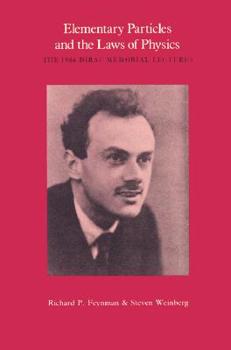Elementary Particles and the Laws of Physics: The 1986 Dirac Memorial Lectures
Select Format
Select Condition 
Book Overview
Developing a theory that seamlessly combines relativity and quantum mechanics, the most important conceptual breakthroughs in twentieth century physics, has proved to be a difficult and ongoing... This description may be from another edition of this product.
Format:Hardcover
Language:English
ISBN:0521340004
ISBN13:9780521340007
Release Date:November 1987
Publisher:Cambridge University Press
Length:124 Pages
Weight:0.55 lbs.
Dimensions:7.8" x 0.8" x 5.5"
Customer Reviews
4 ratings
Great book
Published by Thriftbooks.com User , 16 years ago
Feynman's lecture is the simplest and the most intuitive explanation of the connection between spin and statistics that I have ever seen! This is a very readable book, no knowledge of quantum field theory is required, but a good understanding of relativity and quantum mechanics is essential for understanding the book. I think every physicist should read these lectures, although very simple, they add a lot to our understanding and even to our knowledge of fundamental physics.
Tougher than the Lectures on Physics
Published by Thriftbooks.com User , 18 years ago
When I readThe Feynman Lectures on Physics including Feynman's Tips on Physics: The Definitive and Extended Edition, I was hoping to understand the reasoning behind the exclusion principle, and was disappointed to find that RPF felt that this was too complex for undergraduates, so he asked them to take it on faith for the moment. Here he is talking to a more advanced audience, and explains it - he was right, it's tough. I'm still struggling to understand it, but I have confidence that this is a good book to help. [Added nearly a year later] Having reread the book several times, I finally understand Feynman's lecture! As is often the case, once I understand the principle, I see relationships to various other things I had not fully understood before. I should also comment on Weinberg's lecture: he's talking about more speculative areas than Feynman, which is perhaps one reason I found him less enlightening than Feynman, but in a rather vague way I follow what he's saying. Certainly these are fascinating ideas, but they don't sing to me like Feynman's lecture.
Great Lectures. Requires Math Background.
Published by Thriftbooks.com User , 19 years ago
This short book, Elementary Particles and the Laws of Physics, offers two lectures: Richard Feynman's The Reason for Antiparticles and Steven Weinberg's Toward the Final Laws of Physics. These two talks comprise the 1986 Dirac Memorial lectures at Cambridge University. Both presentations are cogently structured and make fascinating reading. The talks were directed at an advanced audience, one that was familiar with quantum mechanics. Unlike many popular presentations by Feynman and Weinberg, these lectures are not suitable for the general layman. However, these lectures are accessible to a persistent (perhaps, stubborn) layman with a calculus background and a deep interest in particle physics. I am not a physicist, but I did take my share of physics, chemistry, and math courses several decades ago. I encountered Schrodinger's equation in more than one class, but not relativistic quantum mechanics. However, having recently read Bruce Schumm's wonderful review of particle physics (titled Deep Down Things), I was sufficiently motivated to work my way through both Dirac memorial lectures. Richard Feynman's lecture, The Reason for Antiparticles, is decidedly the more difficult. Feynman first demonstrates that quantum mechanics and relativity together require the existence of antiparticles, and then shows that they also establish the spin-statistics connection. Within a few pages advanced mathematical expressions appear and then persistently stay in the foreground for nearly the entire talk. Although understanding Feynman's mathematics is critical for a full and deep appreciation of his exposition, with careful, repeated readings the stubborn layman will have sudden moments of enlightenment and can come away with a deeper understanding of antiparticles and spin statistics. For readers engaged in some self-tutorial readings, it may prove helpful to return occasionally to this classic Feynman lecture to qualitatively measure progress. I have no doubt that, on a deeper level, Feynman's lecture will similarly challenge and enlighten physics majors as well. Steven Weinberg discusses his speculations on the shape of a final underlying theory of particle physics. Initially, his talk is deceptively easy as few mathematical expressions are used. However, about midway a Lagrangian density equation appears, ratcheting the difficulty several notches, as Weinberg considers a theoretical framework based on quantum mechanics and a few symmetry principles, that is also mathematically consistent with the Lagrangian dynamical principle. After discussion of some limitations of the Standard Model, Weinberg concludes his talk with a somewhat mathematical introduction to string theory.
Two of the best give great insight into fundamentals.
Published by Thriftbooks.com User , 27 years ago
Feynman yet again gives great insight into the laws of physics, this time exploring the reasons for existence of anti-particles, starting from the dirac equation etc.. Plus some really outstanding photographs, that fella Weinberg will be chuffed to have his name mentioned on the book cover!






